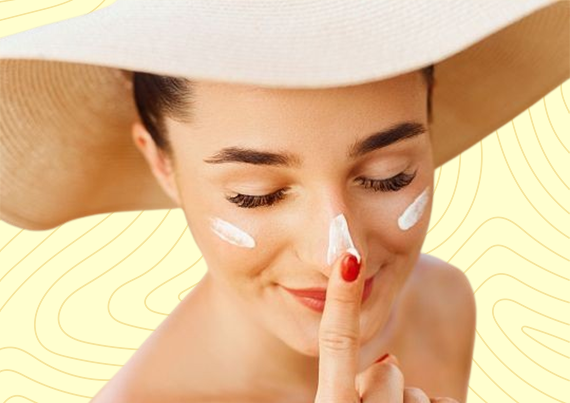
In the pursuit of healthy, radiant skin, few things rival the importance of sunscreen. It's our trusty shield against the sun's harmful rays, defending our complexion from premature ageing, sunburns, and even more serious conditions like skin cancer. But for many of us grappling with acne-prone skin, there's a nagging concern lurking beneath the surface: could sunscreen be causing those pesky breakouts?
It's a conundrum that's all too familiar. We diligently apply sunscreen to protect our skin, only to find ourselves battling unexpected blemishes and flare-ups. It's enough to make anyone question whether the benefits of SPF protection are worth the risk of exacerbating acne. But fear not – in this exploration, we'll navigate the intricate relationship between sunscreen and acne, shedding light on common misconceptions and equipping you with the knowledge to make informed skincare choices. So, let's get started and discover the truth about this skincare concern.
Understanding Acne and Sunscreen
Acne is a common skin condition affecting millions worldwide, with various causes and manifestations. Sunscreen, a popular skincare product, is often considered a saboteur of clear skin due to its broad-spectrum protection and SPF prowess. Sunscreen ingredients like zinc oxide and avobenzone protect the skin from sunburns and skin damage, reducing the risk of premature ageing and melanoma. However, it doesn't inherently cause acne. When used correctly, it can be a valuable ally in the battle against blemishes. The real culprit is often the formulation, with certain ingredients like heavy oils, comedogenic substances, and pore-clogging additives triggering breakouts in sensitive or acne-prone skin types.
To avoid this, opt for non-comedogenic, oil-free formulations and steer clear of potential acne aggravators. By choosing the right sunscreen, you can enjoy sun protection without compromising your skin's clarity. By dispelling the myth and embracing the symbiotic relationship between sunscreen and acne control, you can bask in the sun's warmth with confidence, knowing your skin is protected and breakouts do not interfere with your skincare routine.
Potential Triggers in Sunscreen Formulations
Now that we've debunked the myth that sunscreen is inherently acne-causing, it's time to explore deeper into the nitty-gritty of sunscreen formulations. While sunscreen itself isn't the villain, certain ingredients lurking within its bottles may indeed spell trouble for acne-prone skin.
First up on our radar: comedogenic versus non-comedogenic ingredients. Comedogenic ingredients are like the mischievous gremlins of skincare, lurking in the shadows, ready to wreak havoc on your precious pores. These sneaky culprits have a knack for clogging pores and trapping sebum, paving the way for those unwelcome eruptions.
On the flip side, we have their virtuous counterparts – non-comedogenic ingredients. These skin saviours are the unsung heroes of acne-prone skincare, boasting formulations that won't suffocate your pores or exacerbate existing breakouts. Instead, they play nice with your skin, allowing it to breathe freely while still providing ample sun protection.
But wait, there's more. Our journey through the sunscreen ingredient list doesn't end there. Brace yourselves for heavy oils, fragrances, and silicones. While these ingredients may sound innocuous enough, they can be potential triggers for acne flare-ups, especially in those with sensitive or reactive skin. Heavy oils, in particular, are like the frenemies of skincare. While they may boast moisturising benefits, they can also wreak havoc on acne-prone skin, leading to pesky breakouts and congestion. Fragrances, too, may titillate the senses but can wreak havoc on sensitive skin types, causing irritation and inflammation.
And let's not forget about silicones – those slippery little devils that lend sunscreen its smooth, velvety texture. While they may create the illusion of flawless skin, silicones can also trap dirt, bacteria, and sebum beneath the surface, potentially exacerbating acne in the process.
So, what's a savvy skincare aficionado to do? Fear not – armed with knowledge and a discerning eye for labels, you can navigate the sunscreen aisle like a seasoned pro. Opt for non-comedogenic, oil-free formulations, and steer clear of potential acne triggers like heavy oils, fragrances, and silicones. Your skin will thank you for it – and those pesky breakouts will be nothing more than a distant memory.
Choosing the Right Sunscreen for Acne-Prone Skin
We've peeled back the layers of sunscreen formulations and identified potential acne triggers, it's time to arm ourselves with the knowledge needed to select the perfect sunscreen for acne-prone skin. After all, finding the holy grail of sun protection shouldn't feel like a daunting quest – it should be a breeze.
While perusing the sunscreen aisle, prioritise formulations labelled as non-comedogenic and oil-free. Think of these labels as your golden ticket to clear, blemish-free skin. By opting for products that won't clog your pores or exacerbate existing breakouts, you're setting yourself up for skincare success. Be sure to give those ingredient lists a thorough once-over. Look out for potential acne triggers like heavy oils, fragrances, and silicones, and steer clear of anything that sets off alarm bells in your skincare-savvy mind. Your skin will thank you for it – and those pesky breakouts will be kept at bay.
When it comes to sunscreen, knowledge is power and understanding those cryptic SPF and PA ratings is key to making an informed decision. SPF, or Sun Protection Factor, measures a sunscreen's ability to shield your skin from UVB rays, the culprits behind sunburns and skin damage. Meanwhile, PA ratings indicate a sunscreen's protection against UVA rays, which can lead to premature ageing and skin cancer. The higher the SPF and PA ratings, the better – so aim high and don't skimp on protection.
Our journey through the sunscreen aisle isn't over just yet. We've reached a crossroads: mineral-based (physical) versus chemical sunscreen options. Mineral-based sunscreens, powered by ingredients like zinc oxide and titanium dioxide, create a physical barrier on the skin's surface, deflecting harmful UV rays like tiny shields of armour. Meanwhile, chemical sunscreens work by absorbing UV radiation and converting it into heat, offering a lightweight, cosmetically elegant option for daily wear.
What about their impact on acne, you ask? Here's the scoop: mineral-based sunscreens are often hailed as the holy grail for acne-prone skin, thanks to their non-comedogenic properties and gentle formulation. Meanwhile, some chemical sunscreen ingredients – like avobenzone and octocrylene, can trigger breakouts on sensitive skin. With a little trial and error, you'll find the perfect sunscreen match for your acne-prone skin. Armed with tips for selecting the perfect sunscreen, a newfound understanding of SPF and PA ratings, and a crash course in mineral-based versus chemical sunscreen options, you're ready to conquer the sunscreen aisle like a seasoned pro. So go forth, dear reader, and bask in the warm embrace of sun protection – your skin will thank you for it.
You can try Teenilicious's SPF Sunscreen Kit which is a comprehensive sun protection solution for acne-prone and sensitive skin. It includes the Teenilicious SPF 50 Gel and the Teenilicious SPF 55 Body Lotion, both designed to protect against harmful UV rays, premature ageing, and pigmentation. The gel is a lightweight, non-greasy sunblock with ingredients like Zinc Oxide and Calendula Flower Extracts to soothe inflammation and promote skin cell regeneration. The lotion, a blend of Neo Heliopan Hydro, Jojoba Seed Oil, and Tocopheryl Acetate, provides all-day antioxidant protection against free radicals and environmental stressors. Both products are photostable and can be applied 15 minutes before sun exposure and reapplied every 2 hours.
Application Techniques and Best Practices
Proper sunscreen application is important for acne-prone skin, especially when blending with other skincare products and makeup. A generous amount of sunscreen is recommended, with a nickel-sized dollop for the face and a shot glass-sized amount for the body. Re-applying sunscreen every two hours, especially during prolonged outdoor or water activities, is essential for optimal protection. Layering sunscreen with other skincare products and makeup is a tricky task, but the golden rule is to apply it thin to thick. Opt for non-comedogenic formulations to minimise clogged pores and breakouts, go for oil-free and water-based products, and avoid heavy creams and lotions.
Common mistakes in sunscreen application include uneven application, neglecting to reapply sunscreen throughout the day, and not ensuring thorough coverage in areas like the ears, neck, and feet. By following these tips, you can confidently step out into the sun, knowing your skin is shielded from harm and breakouts need not stand in your way.
Managing Acne While Using Sunscreen
Managing acne while using sunscreen can be a challenging task. To achieve clear, protected skin, it's essential to choose the right skincare products and ingredients, such as salicylic acid, benzoyl peroxide, or retinoids, which work to unclog pores, reduce inflammation, and eliminate blemishes. Consistency in sunscreen use is crucial, as it not only prevents sunburns and premature ageing but also serves as your first line of defense against skin cancer. Despite the temptation to skip sunscreen on breakout-prone days, it's essential to use it consistently to protect your skin.
When in doubt, seek professional guidance from a dermatologist or skincare professional. They can provide personalized recommendations and insights to help you find the perfect sunscreen formulation for your acne-prone skin. By incorporating acne-fighting ingredients into your skincare routine, prioritizing consistency in sunscreen use, and seeking expert advice when needed, you can navigate the delicate balance between acne management and sun protection with ease.
Finding the perfect sunscreen isn't a one-size-fits-all endeavor. Skin types vary, preferences differ, and what works wonders for one person may not necessarily be the best fit for another. That's why we encourage you to experiment with different sunscreen options, to explore and discover what works best for your individual skin needs. Whether it's a lightweight gel for acne-prone skin or a luxurious lotion for all-over protection, there's a sunscreen out there with your name on it. So go forth, dear reader, armed with the knowledge and confidence to face the sun with grace and poise. Remember – sun protection isn't just a skincare routine, it's a lifelong commitment to the health and vitality of your skin. Embrace the sun, explore your options, and bask in the warm glow of clear, protected skin. Your skin will thank you for it – today, tomorrow, and for years to come.



























